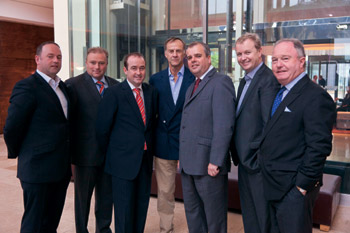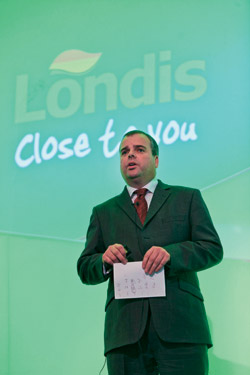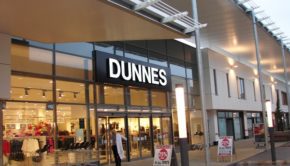Londis Annual Retailer Conference

Over 300 delegates from Londis stores across the country and industry personnel attended the group’s 2010 Annual Retailer Conference in Galway last month.
12 October 2010
Speakers at the conference all brought relevant practical information to the delegates. Matt Cooper did the honours as master of ceremonies and in his introduction spoke of how the Irish people rewarded ourselves too much during the boom and that pay and rates have to come down to make us more competitive. He said we also needed to accept that things will get worse before they get better.
Growth by mid next year
Gerard O’Neill from Amarach Research delivered the good news that there should be growth in the economy by mid next year. He also revealed that once the recession is over there will be a lot of “pent up demand” and consumers will want to spend in the following order; holidays, clothes, groceries, cars, eating out and furniture. Also he said that with a baby boom on the way it is a good indicator of long-term prospects. Amarach research is showing that not surprisingly a quarter of households are finding that their income is less than sufficient at the moment.

Demand: Gerard O’Neill explains the concept of “pent up demand”

Demand: Gerard O’Neill explains the concept of “pent up demand”
Change in consumer preferences
O’Neill revealed that people’s preferences have changed dramatically since 2001. Back then when people were asked what was the most important factor in shopping is was convenience first, then price and thirdly quality. The same questions in 2010 had very different answers with an overwhelming 70% saying that price was the most important factor, then convenience, followed by quality.
This year 53% of people surveyed by Amarach said that they care about promotions and price.
Retailers cannot depend on customers’ loyalty anymore with one fifth changing grocery store over the past year.
Become famous for something
James Burke, retail consultant urged retailers to pick three things and become famous for them such as customer service, strong links to artisan food companies, bakery or even loyalty cards.
He also said that a good retailer needed to be obsessive about standards.
Government support needed to reduce crippling costs
Following a survey of its retailer members as part of the conference some of the key issues that became apparent were competition within the marketplace and the need to increase the value offering of promotional and private label products for consumers. Retailers also said the Government needed to provide more support to address business input costs such as wage costs and local government charges.
62% of retailers surveyed detailed intense competition within the marketplace as the biggest challenge facing Irish grocery retailers with customer retention, cash flow management and additional cost reduction identified as the three most important areas of focus for independent retailers.
Promotions up
Almost all of the retailers surveyed (96%) revealed that consumers are purchasing a higher percentage of grocery shopping ‘on promotion’.
Two thirds of Londis retailers surveyed called for Government support on the issue of wage costs. The existing JLC system raises retail wage rates by up to 25% higher than the national minimum wage.
Stephen O’Riordan, chief executive, ADM Londis plc said: “In our survey almost 90% of retailers believe that it will be the second quarter of 2011 and beyond before the Irish economy returns to growth.”
Over half of retailers referenced the availability of private label goods as being very important for their businesses to remain competitive. 79% of retailers believe that the range of private label goods available will increase in 2011 with 85% stating that the quality of these products had increased in 2010.

Development: Peter Foley outlines new relationship with Nisa Today’s

Development: Peter Foley outlines new relationship with Nisa Today’s
Nisa alliance
Peter Foley, commercial director, ADM Londis plc outlined how the business is working closely with a range of suppliers in Ireland and internationally supporting Londis retailers and consumers. “A major development in 2009 was the establishment of a strategic alliance with UK wholesaler, Nisa Today’s. This alliance delivers in excess of U6 billion buying power to retail members, whilst also bringing one of the most credible private label offerings in the sector, to Londis’ consumers.”
Focus on….
David Sands
With over 26 stores throughout Scotland, David Sands, chief executive officer of David Sands Ltd was voted convenience retailer of the year at the UK based, convenience tracking programme awards. Sands is also ex-chairman of Nisa Today’s Retailer Council. Fionnuala Carolan caught up with him after the conference
In his role as chairman of Nisa Today’s Retailer Council, Sands was instrumental in the development of its retail trading policies and strategies. As the fifth generation of his family to be involved in retailing, David had a good start in the business. His father owned a shop in Kinross on the east coast of Scotland and after university in Edinburgh he joined Sainsburys Graduate programme in London for about a year. When his Dad took on another small newsgagents in Scotland in the early 90s, he came home to work in it. “I worked really hard the first year to get the sales up and we probably added on 50% but I discovered at the end of the first year that we hadn’t made any profit. I was working hard and there was someone else working hard stealing and we didn’t have the systems in place to find this quickly. I learned a lesson. There is no point building turnover if you are not making money and in order to do that you have to have good systems in place.”
Getting into the business young
His dad handed over the business over to him during that first year when he was just 21 giving him huge responsibility at a young age. “This was early 90s and it was a tough time. Interest rates were at 15% and the supermarkets were beginning to encroach on our time. You were just starting to see Tesco emerge.”
He says that he began to realise that convenience stores traded well beside supermarkets and they grew the business accordingly.
In 1995 a trip to Las Vegas to the National Association of Convenience Stores annual exhibition opened his eyes to possible opportunities that would set aside his stores from the competition. “We saw services in stores and food-to-go. So we saw a new route for our business that would set us apart from everyone else.
“We started putting post offices and ATMs in our stores. The customer reaction was brilliant. Lottery was a big thing for us at the time. I think a lot of retailers work hard but focus solely on their own business and the day-to-day running and not watching their competitor and looking at where the business is going to be in five years time.”
Sands became very involved with the trade association in Scotland and when he was just in his late twenties he became president of the Grocer’s Federation which really raised the profile of the business.
Figure out what you do well
His philosophy is that you have to figure out what you do well and really push this message home to customers. “We particularly focus on bakery but it doesn’t have to be that but you do need to stand out for one thing.” He also thinks it’s vital to keep staff motivated and interested. “We do a lot to incentivise staff. We give our employees shares in the business.”
Another important thing he says is to “make sure that what is on your shelf actually sells. It sounds so very obvious but a lot of people have things that sit on their shelves gathering dust.”
Involvement with Nisa
About two and a half years ago when Neil Turton took over as chief executive of Nisa Today’s he set up a special board for the retail and the wholesale council to report into. “They were looking for a chairman and I thought we want to get this established and have the meetings run the right way so for the first few years I chaired that. There were 17 retail members representing different parts of the country and the key executives from Nisa sit as well. The discussions centred around trading strategies. We meet up four or five times a year but as well as that we have regional meetings so I would chair those in Scotland.”
Looking at Londis Stores
On his journey from Shannon Airport to Galway for the conference Sands took the opportunity to look at some of the Londis stores along the way as he admits he always visits competitors stores to see what he could be doing better.
“Any half decent retailer going into another shop will see something good. No matter if you own one or a hundred shops you should be getting out and watching your competitors and ask yourself a simple question. What does this shop do better than me? Then go away and implement it in your business.”
Sands says that independent retailers have a huge advantage as they have the autonomy to change their business at a moment’s notice to suit the market. “The great thing about being an independent retailer is that you can change whatever you like about your store without having to go through numerous committees. It’s a massive advantage. If something’s not working, change and do something else.”
Considering all the negative feeling in the Irish economy at present, Sands says that being an independent retailer means you should always be changing and adapting your business.
“Convenience retailing is always changing and that’s a certainty. I’m also quite optimistic about Ireland and Scotland as this industry is a highly dynamic business and is used to changing to suit the market. I think UK and Ireland are amongst the best convenience store operators in the world from what I’ve seen.”
A man always looking to do something new he is now considering implementing an all-night food concept in his stores. “Food to go at night is something we’re interested in whether that’s taking in a fast food concession or not. I’m not sure yet. I would like the idea of going to bed and knowing I was still making money. That would appeal to me!”



 Print
Print






Fans 0
Followers